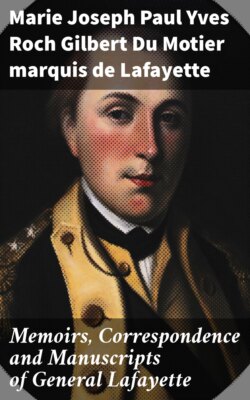Читать книгу Memoirs, Correspondence and Manuscripts of General Lafayette - marquis de Marie Joseph Paul Yves Roch Gilbert Du Motier Lafayette - Страница 15
На сайте Литреса книга снята с продажи.
E. — ARRIVAL OF THE FRENCH FLEET.
ОглавлениеTable of Contents
The treaty with France became known a short time before the opening of the campaign. The national enthusiasm for the Americans had much increased, but the ministry was afraid of war. Necker, in particular, did all he could to prevent the court of France from espousing the American cause, which may serve as an answer to the accusations of revolutionary ardour that were made against him by the aristocrats in France. Maurepas was very timid, but the news of the taking of Burgoyne inspired him with some courage. The Count de Vergennes flattered himself that he should succeed in avoiding war. The court of France shewed little sincerity in its proceedings with England. The treaty was at length concluded. Dr. Franklin, Silas Deane, and John Adams, accompanied by many other Americans then in Paris, were presented to the King and royal family. They repaired afterwards to the young Madame de Lafayette, who was at Versailles, wishing to testify by that public act how much they thought themselves indebted to Lafayette for the happy direction which their affairs had taken. The news of the treaty excited a great sensation in America, and, above all, in the army. Lafayette had long since returned from his command in the north to the head-quarters of General Washington. The manifesto of the French government to the British cabinet contained this expression: "The Americans having become independent by their declaration of such a day." "That," said Lafayette, smiling, "is a principle of national sovereignty which shall one day be recalled to them." The French revolution, and the part which he took in it, have doubly verified this prediction. (Manuscript No. 1.)
Mr. Marshall's work contains a curious dissertation upon the declaration of war between France and England, and gives also the extract of a memorial of M. Turgot, which it would be interesting to verify. It would then be seen what opinions were supported at that time, concerning the colonies in general, and the quarrel with the English colonies in particular, by one of the most liberal and enlightened men in regard to political and commercial questions. The idea that the queen supported the war party is not correct; her social tastes were rather of the Anglomania kind; her politics were completely Austrian, and the court of Vienna did not wish that France should have any pretext for refusing to fulfil the conditions of the treaty made with it, which were soon afterwards exacted; but the queen, like a true woman of the world, followed the impulse given by Paris, the commercial towns, and the public.
Dr. Ramsay alludes to the happiness which Lafayette must have experienced when, upon learning the happy news of the French alliance, he, with tears of joy, embraced his illustrious general. Several persons present have since recollected that when the message of the court of Versailles to that of London was read aloud, with all the justifications which dwelt upon the right of the American nation to give themselves a government, Lafayette exclaimed,—"That is a great truth which we will recall to them at home." (Manuscript No. 2.)
